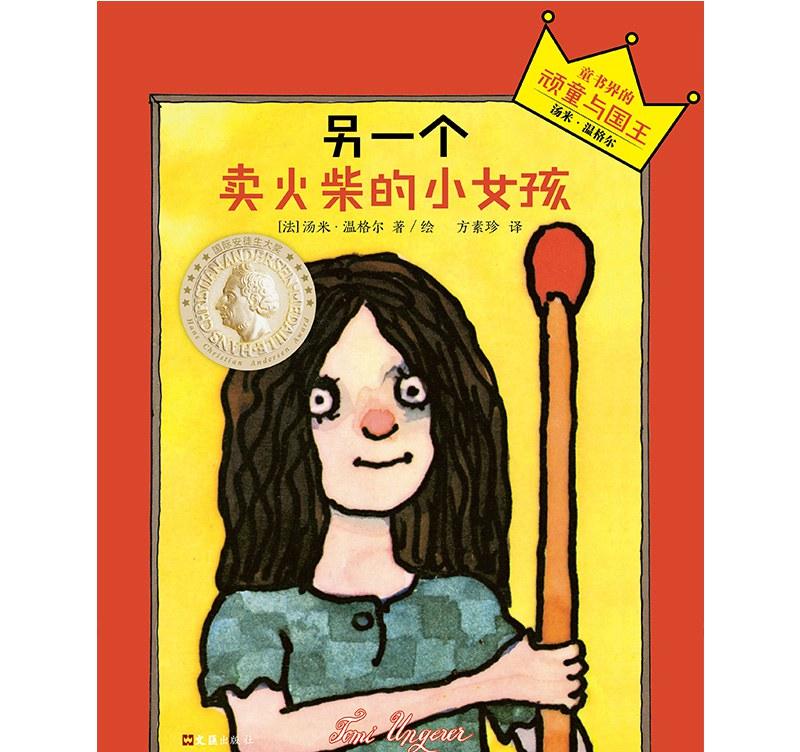This is the 264th article of Zhishutang, the length of the article is 1266 words, and it takes 2-3 minutes to read.
The Chinese picture book I read with the kids this evening is the story of Another Little Girl Who Sold Matches.
The author is Tomi Ungerer, a French picture book writer, illustrator, toy collector, and a naughty boy and king of the children's book world. In 1998, the Children's Book Consortium (IBBY) presented him with the Hans Christian Andersen Prize, an award that represents a lifetime achievement in the children's book industry, in recognition of his great contributions to children's literature.

Born in 1931 in the Franco-German border of Alsace, Tommy Wenger spent his childhood in the war. As a young man, he traveled extensively around Europe, designing windows and making a living in print advertising. After coming to New York, USA, he quickly achieved success in the picture book industry with his amazing talent and became a legend.
Tommy Wenger has a wide range of influence in the United States and Europe, being one of the "500 Influential Leaders" elected by the American Association for Biographical Celebrities in 1992, an Ambassador for Children's Culture and Education at the Council of Europe, and co-authoring the Declaration on the Rights of the Child. The museum built for him is one of the top ten museums in Europe. His career has continued from the 1960s to the present, and he has published more than 140 books and translated into nearly 30 languages, using English, French and German.
In Tommy Wenger's story, the little girl who sells matches is also about to freeze to death on Christmas Eve. But the little girl who sold matches was a little luckier than the little girl who sold matches. When she blew out the last match, her wish came true...
This story, which subverts the classic Hans Christian Andersen fairy tales, continues Tommy Wenger's usual style — under the appearance of playfulness, there is a gentle hope: that the little girl who sells matches will not die, and that no matter how weak and weak people may seem, they will have the power to change the world.
The little girl who sold matches ended up forming the "World Invincible Light" foundation, and the weakest child became the most "invincible" person. This is Tommy Wenger's book of growth for children, and it brings every child warm hope. This is also a fairy tale written by Tommy Wenger to adults, which makes every adult child believe that "miracles" exist, and that "miracles" stem from the kindness of people and make the world a better place.
At the beginning of the story, I first asked the children if they had heard the story of the little girl who sold matches, and then the child Jinjin volunteered to tell the story, and then according to the plot of the little girl, he also slightly adapted it.
While interacting with the children, and interacting with them in questions and answers, one page is about the little girl going to a bakery, seeing delicious bread, and wanting to eat it very much, but being violently chased away by the baker, and warning her that if she came again, she would beat her.
Then I asked the children: If you were a baker, would you give bread to the children? Then they said of course they would share it with the little girl, and then they said that the little girl was very pitiful and wanted to help her. Hearing the children's answers, my heart was still quite warm and touching. How innocent and friendly the child's heart is.
After reading "The Other Little Girl Who Sold Matches," I asked them if they knew what the money we usually use is.
Then they replied, "There are three main uses: buying things, saving them, and donating them." “。
I said that there are still many children on the earth who are hungry and still can't eat enough every day, are you willing to donate your pocket money to buy them food to eat? Then a lot of kids said, "Very willing!" ”
Among them, Tong Tong said: "Every month, I will donate a part of my pocket money to the children in the countryside." ”
Then Yang Chen said to me: "I grew up to be nine years old, my mother did not give me a penny of pocket money, I would like to donate, but I have no money." “
After listening to the children's answers, I believe more firmly in my heart: "Children are the fathers of adults" Many times. Children often teach us more.